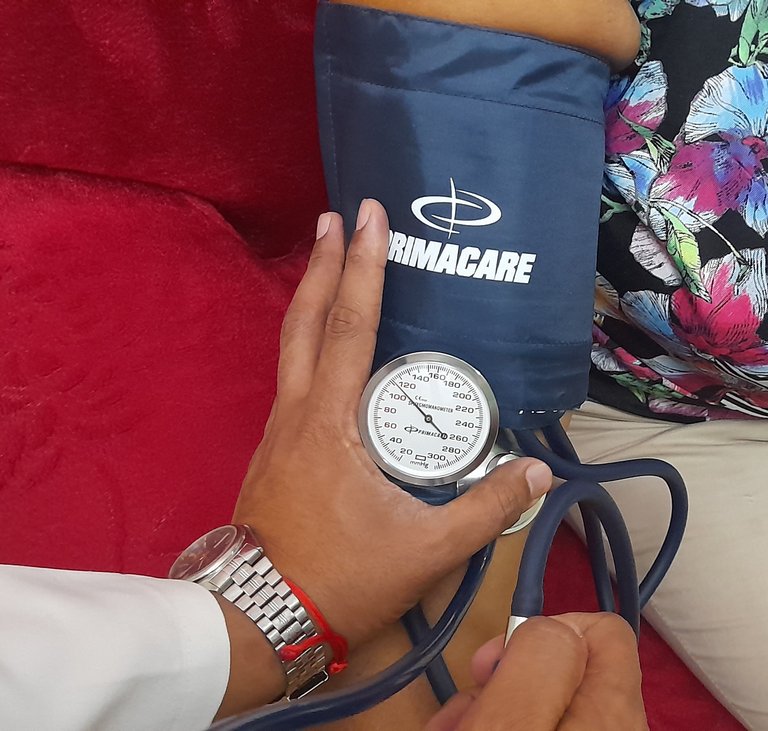Hola amigos de #hive y de #holos-lotus espero que se encuentren bien de salud y con paz espiritual. Hoy les vengo a hablar de un tema que tiene suma importancia en la sociedad actual ya que cada día son más las personas que padecen enfermedades crónicas.
Recuerdo decía una profesora de la universidad que ...más que pesquisar dengue u otras enfermedades virales, debemos de pesquisar hipertensión y diabetes y así tendremos menos mortalidad en el mundo... y no se equivocaba.
Soy médico anestesiólogo y estas enfermedades y sus complicaciones me tocan de cerca en el trabajo por eso paso por acá a dejarles algunas consideraciones sobre el enfoque integral que hay que mantener para tratarlas de la forma mas adecuada posible.

Las enfermedades crónicas son condiciones de salud que perduran a lo largo del tiempo, a menudo durante toda la vida; incluyen diabetes, hipertensión, cardiopatias, artritis, asma bronquial, entre otras, por cierto sabian que el cáncer se intenta convertir en una de estas, bueno otro dia hablaremos de ello.
Estas enfermedades aparecen principalmente en edades avanzadas, lo que no quiere decir que los más jovenes no la padezcan, de hecho, cada dia hay más jóvenes enfermos por estas, por tanto a medida que la esperanza de vida aumenta y las poblaciones envejecen, el manejo de estas condiciones se vuelve cada vez más crucial, constituyendo un desafío significativo para la salud pública mundial.
El ser humano está conceptualizado como un ente biopsicosocial por tanto para tratarlas adecuadamente es importante considerar no solo los aspectos biológicos de las enfermedades, sino también su impacto psicológico y social.
La predisposición genética, hábitos de vida poco saludables como una dieta inadecuada, falta de actividad física y consumo de tabaco o alcohol son parte de los múltiples factores de riesgo que influyen en la perspectiva biológica de las Enfermedades Crónicas. Por ejemplo, la diabetes está estrechamente relacionada con la obesidad y el sedentarismo. Comprender y conocer estos factores permite implementar estrategias de prevención efectivas. Promover estilos de vida saludables, que incluyan una alimentación equilibrada y actividad física regular, es fundamental para reducir la incidencia de estas enfermedades.

Como decíamos, la biología no es el único componente a considerar. El aspecto psicológico juega un papel primordial en el manejo de las enfermedades crónicas. Los pacientes se enfrentan a un impacto emocional significativo cuando reciben un diagnóstico; aparecen la ansiedad, la depresión y el estrés, afectando la capacidad para adherirse a los tratamientos y realizar cambios en su estilo de vida. El ejemplo más clásico, cuand se diagnostica hipertensión, la persona se siente abrumada por la necesidad de cambiar su dieta y adoptar un régimen de ejercicio, lo que conlleva a la frustración y al desánimo, momento en que la psicología vuelve a preponderar pues se necesita de apoyo psicológico de la familia y por parte del equipo de salud que debe ofrecer terapias cognitivo-conductuales, grupos de apoyo y técnicas de manejo del estrés, herramientas valiosas para ayudar a afrontar sus emociones y desarrollar habilidades para manejar su condición. Además, la educación sobre la enfermedad y sus implicaciones le permite tomar decisiones informadas sobre su salud.
Lo social también es fundamental en el contexto de las enfermedades crónicas. Hablamos ya de la importancia de la familia en cuanto al apoyo ya que el aislamiento social puede tener efectos adversos en el bienestar general del paciente. Es esencial que los sistemas de atención médica reconozcan la importancia del apoyo social y trabajen para involucrar a la familia y la comunidad en el proceso de tratamiento.
Importante considerar la influencia de los factores socioeconómicos en el manejo de las enfermedades crónicas. Las personas con menos recursos económicos a menudo enfrentan barreras para acceder a atención médica adecuada, medicamentos y alimentos saludables; lo que resulta en una deficiencia en el manejo de sus condiciones y un aumento en las complicaciones asociadas. La equidad en salud es un objetivo crucial que debe ser abordado por las políticas públicas para garantizar que todos los individuos tengan acceso a la atención necesaria.

Viendo todos los aspectos, ejes o esferas, debemos hablar de la conjunción de estos puesto que como dijimos al inicio el hombre es un ser biopsicosocial y por tanto el enfoque terapéutico debe ser integral, en el manejo de cualquier enfermedad para esto se necesita incluir la promoción de políticas de salud pública que fomenten estilos de vida saludables y faciliten el acceso a servicios médicos adecuados. Realizar campañas sobre prevención y manejo de enfermedades crónicas son esenciales para crear conciencia en la población. La colaboración estrecha entre profesionales de la salud, pacientes y comunidad es fundamental para mejorar la calidad de vida de quienes viven con enfermedades crónicas y promover un futuro más saludable para todos. La educación, el apoyo emocional y el acceso equitativo a los servicios son pilares esenciales en esta lucha contra las enfermedades crónicas.
Espero que lo poco que he dejado por acá, les sirva para ustedes o para apoyar a algun familiar que lo necesite. No dejen de decirme sus consideraciones en los comentarios.
Las fotos son de mi propiedad
Hello friends of #hive and #holos-lotus, I hope you are in good health and with spiritual peace. Today I come to talk to you about a topic that is of utmost importance in today's society, since every day there are more people who suffer from chronic diseases.
I remember a university professor saying that ... more than detecting dengue or other viral diseases, we should detect hypertension and diabetes and thus we will have less mortality in the world... and she was not wrong.
I am an anesthesiologist and these diseases and their complications affect me closely at work, so I am here to leave you some considerations on the comprehensive approach that must be maintained to treat them in the most appropriate way possible.

Chronic diseases are health conditions that persist over time, often throughout life; they include diabetes, hypertension, heart disease, arthritis, bronchial asthma, among others, by the way did you know that cancer is trying to become one of these, well another day we will talk about it.
These diseases appear mainly at advanced ages, which does not mean that younger people do not suffer from them, in fact, every day there are more young people who are sick from these, therefore as life expectancy increases and populations age, the management of these conditions becomes increasingly crucial, constituting a significant challenge for global public health.
Human beings are conceptualized as biopsychosocial entities, so in order to treat them appropriately, it is important to consider not only the biological aspects of diseases, but also their psychological and social impact.
Genetic predisposition, unhealthy lifestyle habits such as an inadequate diet, lack of physical activity, and tobacco or alcohol consumption are part of the multiple risk factors that influence the biological perspective of Chronic Diseases. For example, diabetes is closely related to obesity and a sedentary lifestyle. Understanding and knowing these factors allows for the implementation of effective prevention strategies. Promoting healthy lifestyles, which include a balanced diet and regular physical activity, is essential to reduce the incidence of these diseases.

As we said, biology is not the only component to consider. The psychological aspect plays a primary role in the management of chronic diseases. Patients face a significant emotional impact when they receive a diagnosis; anxiety, depression and stress appear, affecting the ability to adhere to treatments and make changes in their lifestyle. The most classic example, when hypertension is diagnosed, the person feels overwhelmed by the need to change their diet and adopt an exercise regimen, which leads to frustration and discouragement, at which point psychology again becomes important because psychological support is needed from the family and from the health team, which must offer cognitive-behavioral therapies, support groups and stress management techniques, valuable tools to help cope with their emotions and develop skills to manage their condition. In addition, education about the disease and its implications allows them to make informed decisions about their health.
The social aspect is also fundamental in the context of chronic diseases. We have already discussed the importance of family support as social isolation can have adverse effects on the patient's overall well-being. It is essential that health care systems recognize the importance of social support and work to involve the family and community in the treatment process.
It is important to consider the influence of socioeconomic factors in the management of chronic diseases. People with fewer economic resources often face barriers to accessing adequate medical care, medications, and healthy foods; resulting in a deficiency in the management of their conditions and an increase in associated complications. Health equity is a crucial objective that must be addressed by public policies to ensure that all individuals have access to necessary care.

Looking at all the aspects, axes or spheres, we must talk about the conjunction of these since as we said at the beginning, man is a biopsychosocial being and therefore the therapeutic approach must be comprehensive, in the management of any disease for this it is necessary to include the promotion of public health policies that encourage healthy lifestyles and facilitate access to adequate medical services. Carrying out campaigns on the prevention and management of chronic diseases are essential to raise awareness in the population. Close collaboration between health professionals, patients and the community is essential to improve the quality of life of those living with chronic diseases and promote a healthier future for all. Education, emotional support and equitable access to services are essential pillars in this fight against chronic diseases.
I hope that the little I have left here will be of use to you or to support a family member who needs it. Don't forget to tell me your thoughts in the comments.